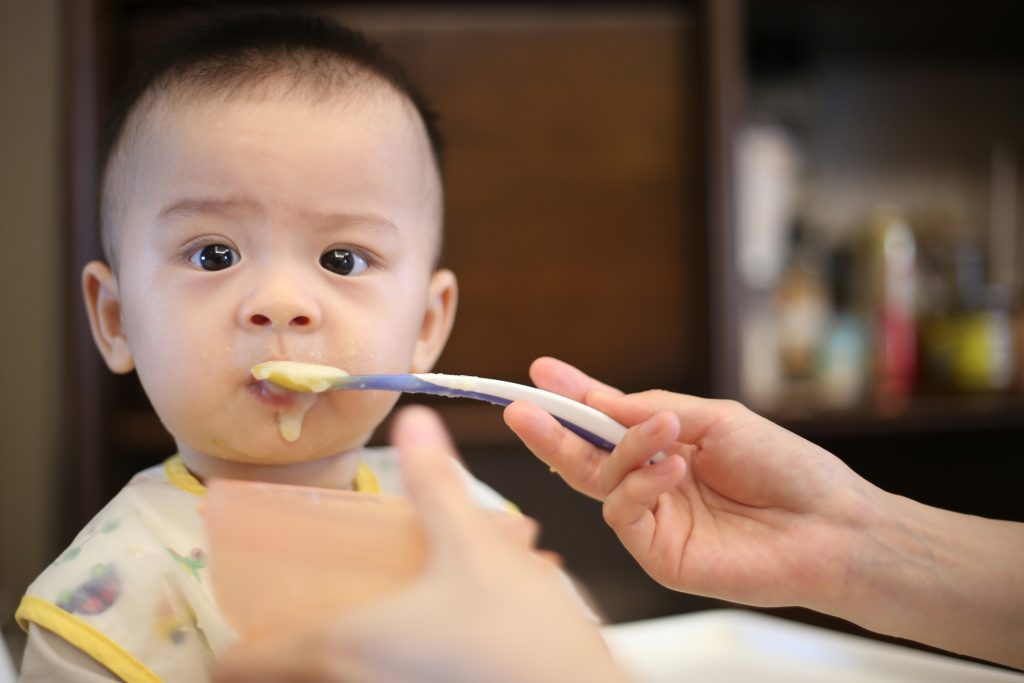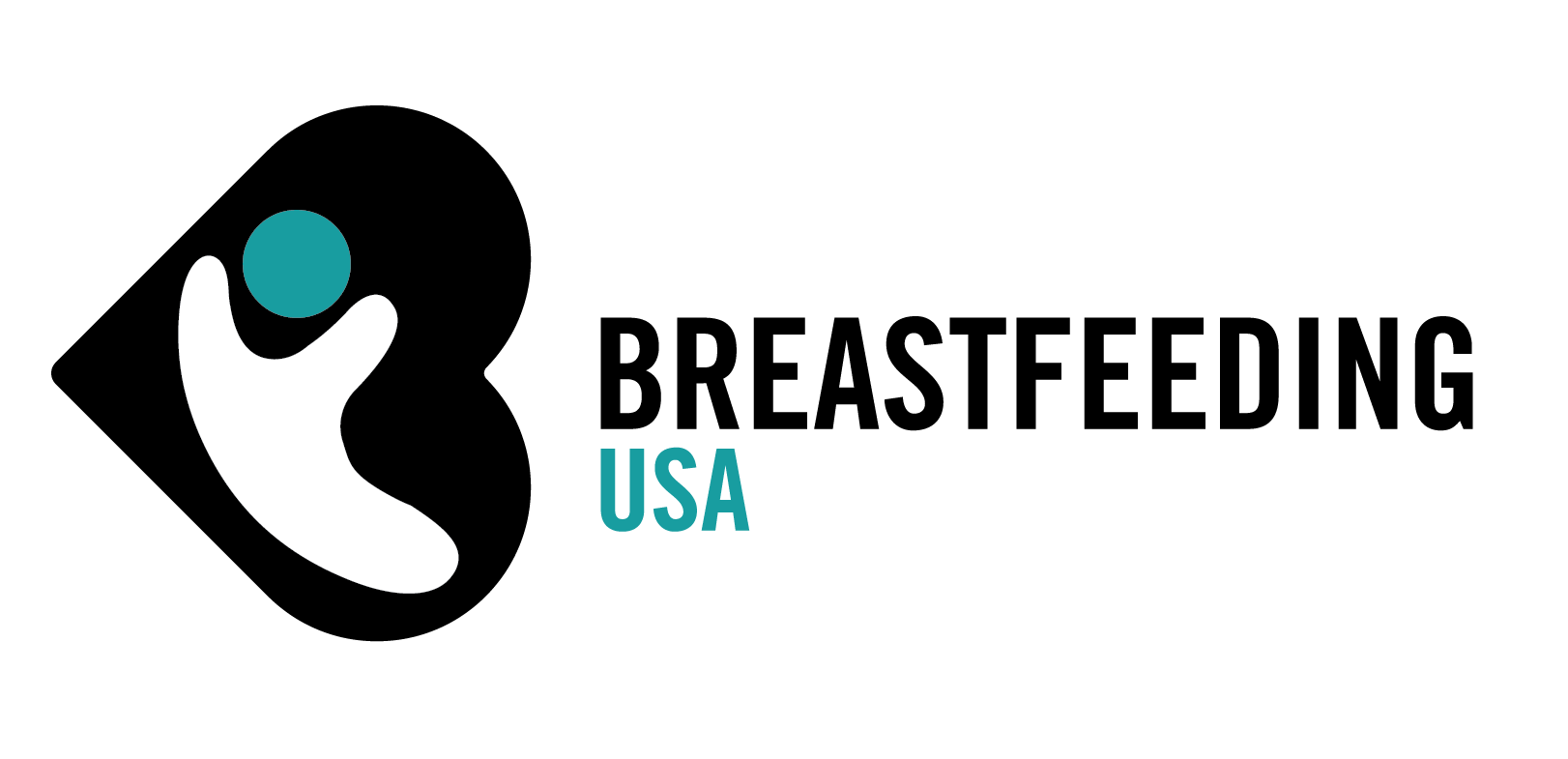By Norma Ritter, IBCLC, RLC
This article is part of a series on Weaning and Starting Solids:
1 of 3: When is the Best Time to Start My Baby on Foods Other Than Breastmilk? (This Article)
2 of 3: Good Foods for Babies
3 of 3: Thinking About Weaning?

The World Health Organization and the American Academy of Pediatrics (AAP) recommend that babies be exclusively breastfed for six months before other foods are introduced. Some babies are ready to start new foods around this time, while others show no interest until they are a bit older. The Recommendations on Breastfeeding by the AAP also state:
“Unique needs or feeding behaviors of individual infants may indicate a need for introduction of complementary foods as early as four months of age, whereas other infants may not be ready to accept other foods until approximately eight months of age.
Introduction of complementary feedings before six months of age generally does not increase total caloric intake or rate of growth and only substitutes foods that lack the protective components of human milk.”1
As you can see, there is no clear cut age when it is best to start solids. The best time to start offering your baby other foods is when he shows signs of being ready.
Of course this time will be different for each baby. We do not expect all babies to crawl or walk or potty train on a certain day of their lives, and we should not expect them all to need solid foods at the same time either. You are the expert on your baby!
Here are some of the signs that your baby may be ready for solids.
He will be able to:
- sit up on the floor for about ten minutes without support2
- use his finger and thumb to pick up toys and put them in his mouth
- swallow a tiny bit of soft food, like ripe banana, without pushing it out of his mouth with his tongue
At this stage, he will probably also seem to be more hungry than usual. If you have already tried nursing him more frequently, and he still does not seem to be satisfied, he may be ready to start adding other foods to his diet. Babies sometimes also want to nurse more because they are teething or not feeling well or going through a growth spurt, so be sure to rule those things out first.
Mothers sometimes wonder if their babies are ready for solids at about four months because of the way their babies are behaving.
Four months is about the time that many babies start to become more interested in the world around them. They are taking everything in. For example, they may pull away from the breast in response to a sudden noise. They may even try to take the breast with them! They may not seem to be as interested in nursing so often or may learn to gulp down their milk quickly to get back to more fun activities.
These are all normal and common ways for four-month-olds to behave. You may find it helpful to nurse your baby in a quiet, dark room a couple of times during the day in order to avoid distractions. Some mothers like wearing a nursing necklace (beads strung and knotted on extra-strong cord that the baby can hold while nursing) because it can help him stay focused on breastfeeding.
Have you noticed your baby watching you very carefully while YOU eat? Does he pretend to chew? This behavior shows how babies learn and practice, and it is one of the signs that they will soon be ready to start eating table foods.
Just follow your baby’s cues and your own instincts.
There is no rush. Nothing magical happens on the very minute/hour/day of the sixth month birthday. A switch does not suddenly turn off and make mother’s milk suddenly inadequate! In fact, some babies have no interest in other foods until much later, sometimes not until they are about a year old.
As long as your baby is happy and healthy, gaining weight, and meeting all his milestones, he is doing fine!
Some parents are told that they must introduce solids by a certain age to provide extra iron and prevent anemia. If there is a concern about your baby’s being anemic, your doctor can do a simple blood test. It only takes a few minutes to see if your baby has enough iron. It is almost unheard of for a completely breastfed baby to have low iron stores or low hemoglobin values before six to nine months. One study, by Piscane, 1995 3, found infants who were exclusively breastfed for seven months (not given iron fortified cereals or iron supplements) had significantly higher hemoglobin values at one year old than breastfed babies who had received solid foods before seven months. None of the babies who were breastfed exclusively for 7 months were anemic at one year, while some of the babies who did receive solids before seven months were found to be anemic. Research like this suggests that delaying solids can reduce the risks of anemia.
Enjoy this special time with your completely breastfed baby. You may be interested in reading the next article in this series, Good Foods for Babies, where I share some suggested first foods and ways to introduce your baby to the delights of a wide variety of healthy foods.
References:
1. American Academy of Pediatrics. Policy Statement on Breastfeeding and the Use of Human Milk, PEDIATRICS Vol. 115 No. 2 February 2005, pp. 496-506 (doi:10.1542/peds.2004-2491)
2. Hassink, Sandra G. MD, FAAPA Parent’s Guide to Childhood Obesity: A Road Map to Health, American Academy of Pediatrics, 2006
3. Pisacane A, et al. Iron status in breast-fed infants. J Pediatrics 1995 Sep;127(3):429-31
Norma Ritter, IBCLC, RLC
Norma Ritter is the mother of three grown children and the grandmother of six grandchildren, all of whom were breastfed.
© Copyright Breastfeeding USA 2012. All rights are reserved.
